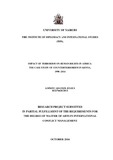| dc.description.abstract | Africa has experienced incessant terror attacks that have grossly violated human rights particularly in Nigeria and Kenya. The counterterror approaches in these countries have worsened the sustenance of human rights due to the inability of States to ensure strong implementation and operationalization of international human rights instruments in their national counterterrorism approach. This study critically analyzes within the period of 1998-2014 in Kenya, the problematic themes of the persistent Human rights violations; reasons for the persistent criticism of the government counterterrorism approaches; and a comprehensive counterterrorism approach that considers the sustenance of human rights. In an inquiry to finding those reasons, this study uses regime theory in bridging the gap between the State‟s realist counterterrorism that often face criticism by the liberalists due to the violation of human rights. The study uses descriptive analysis aided by secondary sourced data and interviews conducted with relevant counterterror and human right advocacy agencies.
The study accepts the hypotheses that: terrorism undermines human rights and basic freedom Africa; the rights of terror suspects, suspect‟s relatives, and other individuals are violated during defensive, criminal justice and war related counterterrorism mechanisms in Kenya; and an effective counterterrorism strategy involves policy frameworks and implementation mechanisms that provide a balance of both human rights and security. The study confirms that in Kenya, the security agencies have violated the rights to life, freedom, arrest and detention, unfair trial and court proceedings renditions and non-refoulement. The findings indicates that there are lack of synergetic efforts between the counterterror State actors and non-State actors in promoting a comprehensive strategy that puts-into consideration, the formulation, implementation, and enforcement of the rule of law: that protects the basic and fundamental rights of terror suspects and victims; and improve of the economic, social and cultural rights of potential terror suspects and victims in Kenya.
The study recommends the use of a cognitive approach of regime theory that ensures an adjustable adaptation to the demand of strong knowledge based and institutionalized system. Such system encompasses: the use of security intelligence and training to reduce the oversights in militaristic counterterror operation that often violates fundamental rights; enhanced commitment of community policing and awareness on the derogability of right in legal and exceptional cases for an improved security; State and non-State actor participation in the promotion of the neglected social, economic, and cultural rights; monitoring and evaluation of rights abuses/violations by joint cooperation of State and non-State actors for effective implementation and enforcement of human rights‟ policies that is beneficial to all; and strict adherence to international and national human rights regimes in the operations of all counterterror agencies. | en_US |



